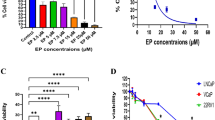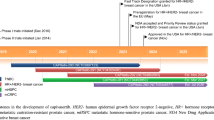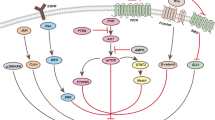Abstract
Purpose
Abiraterone acetate (AA) plus prednisone is an approved treatment of advanced prostate cancer (PCa). Autophagy is linked to drug resistance in numerous types of cancers. We hypothesized, that upregulation of autophagy is one of the mechanisms by which PCa cells survive AA anti-tumor treatment and therefore evaluated the potential effect of a combination with autophagy inhibition.
Methods
Human PCa LNCaP cell lines were cultured in steroid-free medium and treated with AA. Autophagy was inhibited by 3-methyladenine, chloroquine and ATG5 siRNA knock-down. Cell viability and apoptosis was assessed by flow cytometry and fluorescence microscopy, and autophagy was monitored by immunohistochemistry, AUTOdot and Western blotting.
Results
Western blot revealed upregulation of ATG5 and LC3 II with a reduction of p62 protein expression in AA-treated cells, indicating upregulation of autophagy. These data were supported by results obtained with immunocytochemistry and AUTOdot assays. Using flow cytometry, we showed that combining AA with autophagy inhibition significantly impaired cell viability (1.3–1.6-fold, p < 0.001) and increased apoptosis (1.4–1.5-fold, p < 0.001) compared to AA treatment alone.
Conclusions
AA activates autophagy as a cytoprotective mechanism in LNCaP prostate cancer cells and targeting of autophagy enhances the antitumor effect of the compound.



Similar content being viewed by others
References
Siegel R, Ma J, Zou Z, Jemal A (2014) Cancer statistics. CA Cancer J Clin 64(1):9–29. https://doi.org/10.3322/caac.21208
Lam JS, Leppert JT, Vemulapalli SN, Shvarts O, Belldegrun AS (2006) Secondary hormonal therapy for advanced prostate cancer. J Urol 175(1):27–34. https://doi.org/10.1016/S0022-5347(05)00034-0
de Bono JS, Oudard S, Ozguroglu M, Hansen S, Machiels JP, Kocak I, Gravis G, Bodrogi I, Mackenzie MJ, Shen L, Roessner M, Gupta S, Sartor AO, Investigators T (2010) Prednisone plus cabazitaxel or mitoxantrone for metastatic castration-resistant prostate cancer progressing after docetaxel treatment: a randomised open-label trial. Lancet 376(9747):1147–1154. https://doi.org/10.1016/S0140-6736(10)61389-X
Berthold DR, Pond GR, Soban F, de Wit R, Eisenberger M, Tannock IF (2008) Docetaxel plus prednisone or mitoxantrone plus prednisone for advanced prostate cancer: updated survival in the TAX 327 study. J Clin Oncol 26(2):242–245. https://doi.org/10.1200/JCO.2007.12.4008
Montgomery RB, Mostaghel EA, Vessella R, Hess DL, Kalhorn TF, Higano CS, True LD, Nelson PS (2008) Maintenance of intratumoral androgens in metastatic prostate cancer: a mechanism for castration-resistant tumor growth. Cancer Res 68(11):4447–4454. https://doi.org/10.1158/0008-5472.CAN-08-0249
de Bono JS, Logothetis CJ, Molina A, Fizazi K, North S, Chu L, Chi KN, Jones RJ, Goodman OB Jr, Saad F, Staffurth JN, Mainwaring P, Harland S, Flaig TW, Hutson TE, Cheng T, Patterson H, Hainsworth JD, Ryan CJ, Sternberg CN, Ellard SL, Flechon A, Saleh M, Scholz M, Efstathiou E, Zivi A, Bianchini D, Loriot Y, Chieffo N, Kheoh T, Haqq CM, Scher HI, Investigators C-A (2011) Abiraterone and increased survival in metastatic prostate cancer. N Engl J Med 364(21):1995–2005. https://doi.org/10.1056/NEJMoa1014618
Ryan CJ, Smith MR, de Bono JS, Molina A, Logothetis CJ, de Souza P, Fizazi K, Mainwaring P, Piulats JM, Ng S, Carles J, Mulders PF, Basch E, Small EJ, Saad F, Schrijvers D, Van Poppel H, Mukherjee SD, Suttmann H, Gerritsen WR, Flaig TW, George DJ, Yu EY, Efstathiou E, Pantuck A, Winquist E, Higano CS, Taplin ME, Park Y, Kheoh T, Griffin T, Scher HI, Rathkopf DE, Investigators C-A (2013) Abiraterone in metastatic prostate cancer without previous chemotherapy. N Engl J Med 368(2):138–148. https://doi.org/10.1056/NEJMoa1209096
Jarman M, Barrie SE, Llera JM (1998) The 16,17-double bond is needed for irreversible inhibition of human cytochrome p45017alpha by Abiraterone (17-(3-pyridyl)androsta-5, 16-dien-3beta-ol) and related steroidal inhibitors. J Med Chem 41(27):5375–5381. https://doi.org/10.1021/jm981017j
Attard G, Belldegrun AS, de Bono JS (2005) Selective blockade of androgenic steroid synthesis by novel lyase inhibitors as a therapeutic strategy for treating metastatic prostate cancer. BJU Int 96(9):1241–1246. https://doi.org/10.1111/j.1464-410X.2005.05821.x
Mostaghel EA, Marck BT, Plymate SR, Vessella RL, Balk S, Matsumoto AM, Nelson PS, Montgomery RB (2011) Resistance to CYP17A1 inhibition with Abiraterone in castration-resistant prostate cancer: induction of steroidogenesis and androgen receptor splice variants. Clin Cancer Res 17(18):5913–5925. https://doi.org/10.1158/1078-0432.CCR-11-0728
Li R, Evaul K, Sharma KK, Chang KH, Yoshimoto J, Liu J, Auchus RJ, Sharifi N (2012) Abiraterone inhibits 3beta-hydroxysteroid dehydrogenase: a rationale for increasing drug exposure in castration-resistant prostate cancer. Clin Cancer Res 18(13):3571–3579. https://doi.org/10.1158/1078-0432.CCR-12-0908
Zhu K, Dunner K Jr, McConkey DJ (2010) Proteasome inhibitors activate autophagy as a cytoprotective response in human prostate cancer cells. Oncogene 29(3):451–462. https://doi.org/10.1038/onc.2009.343
Li M, Jiang X, Liu D, Na Y, Gao GF, Xi Z (2008) Autophagy protects LNCaP cells under androgen deprivation conditions. Autophagy 4(1):54–60
Mortezavi A, Salemi S, Rupp NJ, Ruschoff JH, Hermanns T, Poyet C, Randazzo M, Simon HU, Moch H, Sulser T, Wild P, Eberli D (2017) Negative LC3b immunoreactivity in cancer cells is an independent prognostic predictor of prostate cancer specific death. Oncotarget 8(19):31765–31774. https://doi.org/10.18632/oncotarget.15986
Fizazi K, Tran N, Fein L, Matsubara N, Rodriguez-Antolin A, Alekseev BY, Ozguroglu M, Ye D, Feyerabend S, Protheroe A, De Porre P, Kheoh T, Park YC, Todd MB, Chi KN, Investigators L (2017) Abiraterone plus prednisone in metastatic, castration-sensitive prostate cancer. N Engl J Med 377(4):352–360. https://doi.org/10.1056/NEJMoa1704174
James ND, de Bono JS, Spears MR, Clarke NW, Mason MD, Dearnaley DP, Ritchie AWS, Amos CL, Gilson C, Jones RJ, Matheson D, Millman R, Attard G, Chowdhury S, Cross WR, Gillessen S, Parker CC, Russell JM, Berthold DR, Brawley C, Adab F, Aung S, Birtle AJ, Bowen J, Brock S, Chakraborti P, Ferguson C, Gale J, Gray E, Hingorani M, Hoskin PJ, Lester JF, Malik ZI, McKinna F, McPhail N, Money-Kyrle J, O’Sullivan J, Parikh O, Protheroe A, Robinson A, Srihari NN, Thomas C, Wagstaff J, Wylie J, Zarkar A, Parmar MKB, Sydes MR, Investigators S (2017) Abiraterone for prostate cancer not previously treated with hormone therapy. N Engl J Med 377(4):338–351. https://doi.org/10.1056/NEJMoa1702900
Attard G, Parker C, Eeles RA, Schroder F, Tomlins SA, Tannock I, Drake CG, de Bono JS (2016) Prostate cancer. Lancet 387(10013):70–82. https://doi.org/10.1016/S0140-6736(14)61947-4
Attard G, Reid AH, Yap TA, Raynaud F, Dowsett M, Settatree S, Barrett M, Parker C, Martins V, Folkerd E, Clark J, Cooper CS, Kaye SB, Dearnaley D, Lee G, de Bono JS (2008) Phase I clinical trial of a selective inhibitor of CYP17, Abiraterone acetate, confirms that castration-resistant prostate cancer commonly remains hormone driven. J Clin Oncol 26(28):4563–4571. https://doi.org/10.1200/JCO.2007.15.9749
Li H, Wang Z, Tang K, Zhou H, Liu H, Yan L, Guan W, Chen K, Xu H, Ye Z (2017) Prognostic value of androgen receptor splice variant 7 in the treatment of castration-resistant prostate cancer with next generation androgen receptor signal inhibition: a systematic review and meta-analysis. Eur Urol Focus. https://doi.org/10.1016/j.euf.2017.01.004
Apel A, Herr I, Schwarz H, Rodemann HP, Mayer A (2008) Blocked autophagy sensitizes resistant carcinoma cells to radiation therapy. Cancer Res 68(5):1485–1494. https://doi.org/10.1158/0008-5472.CAN-07-0562
White E, Mehnert JM, Chan CS (2015) Autophagy, metabolism, and cancer. Clin Cancer Res 21(22):5037–5046. https://doi.org/10.1158/1078-0432.CCR-15-0490
Gubko AA, Bespal’chuk PI, Volkov VF (1990) Surgical treatment of injuries of the long flexor tendon of the 1st finger. Ortop Travmatol Protez 7:16–18
Richards J, Lim AC, Hay CW, Taylor AE, Wingate A, Nowakowska K, Pezaro C, Carreira S, Goodall J, Arlt W, McEwan IJ, de Bono JS, Attard G (2012) Interactions of Abiraterone, eplerenone, and prednisolone with wild-type and mutant androgen receptor: a rationale for increasing Abiraterone exposure or combining with MDV3100. Cancer Res 72(9):2176–2182. https://doi.org/10.1158/0008-5472.CAN-11-3980
Hammond EM, Brunet CL, Johnson GD, Parkhill J, Milner AE, Brady G, Gregory CD, Grand RJ (1998) Homology between a human apoptosis specific protein and the product of APG5, a gene involved in autophagy in yeast. FEBS Lett 425(3):391–395
Salemi S, Yousefi S, Constantinescu MA, Fey MF, Simon HU (2012) Autophagy is required for self-renewal and differentiation of adult human stem cells. Cell Res 22(2):432–435. https://doi.org/10.1038/cr.2011.200
Rosenfeld MR, Ye X, Supko JG, Desideri S, Grossman SA, Brem S, Mikkelson T, Wang D, Chang YC, Hu J, McAfee Q, Fisher J, Troxel AB, Piao S, Heitjan DF, Tan KS, Pontiggia L, O’Dwyer PJ, Davis LE, Amaravadi RK (2014) A phase I/II trial of hydroxychloroquine in conjunction with radiation therapy and concurrent and adjuvant temozolomide in patients with newly diagnosed glioblastoma multiforme. Autophagy 10(8):1359–1368. https://doi.org/10.4161/auto.28984
Rangwala R, Chang YC, Hu J, Algazy KM, Evans TL, Fecher LA, Schuchter LM, Torigian DA, Panosian JT, Troxel AB, Tan KS, Heitjan DF, DeMichele AM, Vaughn DJ, Redlinger M, Alavi A, Kaiser J, Pontiggia L, Davis LE, O’Dwyer PJ, Amaravadi RK (2014) Combined MTOR and autophagy inhibition: phase I trial of hydroxychloroquine and temsirolimus in patients with advanced solid tumors and melanoma. Autophagy 10(8):1391–1402. https://doi.org/10.4161/auto.29119
Barnard RA, Wittenburg LA, Amaravadi RK, Gustafson DL, Thorburn A, Thamm DH (2014) Phase I clinical trial and pharmacodynamic evaluation of combination hydroxychloroquine and doxorubicin treatment in pet dogs treated for spontaneously occurring lymphoma. Autophagy 10(8):1415–1425. https://doi.org/10.4161/auto.29165
Acknowledgements
This study was supported by Janssen Pharmaceutica NV and Fond zur Förderung des akademischen Nachwuchses (FAN). Special thanks to Damina Balmer for the critical assessment of this manuscript.
Author information
Authors and Affiliations
Contributions
AM and SS contributed equally to this work: project development, carried out all the experiments, data collection, interpretation and manuscript writing. BK and OG: data collection and revising the manuscript. TS: revising the manuscript. HUS: data interpretation and revising the manuscript and DE: project development, data interpretation and manuscript writing.
Corresponding author
Ethics declarations
Conflict of interest
The authors declare that they have no conflict of interest.
Ethical approval
This article does not contain any studies with human participants or animals performed by any of the authors.
Informed consent
Informed consent was obtained from all the individual participants included in the study.
Electronic supplementary material
Below is the link to the electronic supplementary material.
345_2018_2385_MOESM2_ESM.tif
Fig. 1S: A-E: A: WST cell proliferation assay: PC3 cells treated with AA 10 µM, 3MA 5 mM, Chl 20 µM and combinations for 2 and 4 days. Absorbance was measured daily at 450 nm. Bars represent mean ± SEM (n = 3). B: Cell death assay. PC3 cells were cultured in the presence and absence of AA 10 µM, 3MA 5 mM, Chl 20 µM and in combination of AA and 3MA and AA and Chl for 4 days. Cell viability was assessed using ethidium bromide and measured by FACS. Values are mean ± SEM of three independent experiments. C: Immunoblotting analysis (day 4) of PC3 cells. No changes of 55 kDa ATG5-ATG12 expression indicating no autophagy activation in response to different treatments. Supplementary material 2 (TIFF 7906 kb)
Rights and permissions
About this article
Cite this article
Mortezavi, A., Salemi, S., Kranzbühler, B. et al. Inhibition of autophagy significantly increases the antitumor effect of Abiraterone in prostate cancer. World J Urol 37, 351–358 (2019). https://doi.org/10.1007/s00345-018-2385-5
Received:
Accepted:
Published:
Issue Date:
DOI: https://doi.org/10.1007/s00345-018-2385-5




